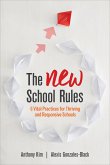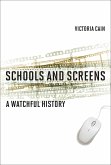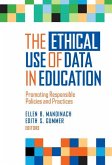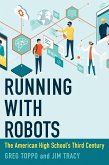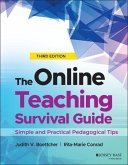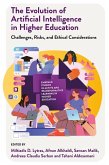Ian Jukes, Ryan L. Schaaf
A Brief History of the Future of Education
Learning in the Age of Disruption
30,99 €
inkl. MwSt.
Versandkostenfrei*
Liefertermin unbestimmt
Melden Sie sich
hier
hier
für den Produktalarm an, um über die Verfügbarkeit des Produkts informiert zu werden.

15 °P sammeln
Ian Jukes, Ryan L. Schaaf
A Brief History of the Future of Education
Learning in the Age of Disruption
- Broschiertes Buch
This book is about accepting the reality of change and encouraging educators or educational stakeholders to be willing to experiment and try new things with learners. It gives an overview of the current state of education and covers what needs to be done to move education to where it needs to be in the future.
Andere Kunden interessierten sich auch für
![Redesigning Learning Spaces Redesigning Learning Spaces]() Robert W. DillonRedesigning Learning Spaces15,99 €
Robert W. DillonRedesigning Learning Spaces15,99 €![The New School Rules The New School Rules]() Anthony KimThe New School Rules41,99 €
Anthony KimThe New School Rules41,99 €![Schools and Screens Schools and Screens]() Victoria CainSchools and Screens22,99 €
Victoria CainSchools and Screens22,99 €![The Ethical Use of Data in Education The Ethical Use of Data in Education]() The Ethical Use of Data in Education43,99 €
The Ethical Use of Data in Education43,99 €![Running with Robots Running with Robots]() Greg ToppoRunning with Robots34,99 €
Greg ToppoRunning with Robots34,99 €![The Online Teaching Survival Guide The Online Teaching Survival Guide]() Judith V. Boettcher (University of Florida)The Online Teaching Survival Guide43,99 €
Judith V. Boettcher (University of Florida)The Online Teaching Survival Guide43,99 €![The Evolution of Artificial Intelligence in Higher Education The Evolution of Artificial Intelligence in Higher Education]() The Evolution of Artificial Intelligence in Higher Education133,99 €
The Evolution of Artificial Intelligence in Higher Education133,99 €-
-
-
This book is about accepting the reality of change and encouraging educators or educational stakeholders to be willing to experiment and try new things with learners. It gives an overview of the current state of education and covers what needs to be done to move education to where it needs to be in the future.
Hinweis: Dieser Artikel kann nur an eine deutsche Lieferadresse ausgeliefert werden.
Hinweis: Dieser Artikel kann nur an eine deutsche Lieferadresse ausgeliefert werden.
Produktdetails
- Produktdetails
- Verlag: SAGE Publications Inc
- Seitenzahl: 192
- Erscheinungstermin: 30. Januar 2019
- Englisch
- Abmessung: 256mm x 200mm x 14mm
- Gewicht: 428g
- ISBN-13: 9781544355023
- ISBN-10: 1544355025
- Artikelnr.: 54841797
- Herstellerkennzeichnung
- Libri GmbH
- Europaallee 1
- 36244 Bad Hersfeld
- gpsr@libri.de
- Verlag: SAGE Publications Inc
- Seitenzahl: 192
- Erscheinungstermin: 30. Januar 2019
- Englisch
- Abmessung: 256mm x 200mm x 14mm
- Gewicht: 428g
- ISBN-13: 9781544355023
- ISBN-10: 1544355025
- Artikelnr.: 54841797
- Herstellerkennzeichnung
- Libri GmbH
- Europaallee 1
- 36244 Bad Hersfeld
- gpsr@libri.de
Ian Jukes has been a teacher, an administrator, writer, consultant, university instructor, and keynote speaker. He is the director of the InfoSavvy Group, an international consulting group that provides leadership and program development in the areas of assessment and evaluation, strategic alignment, curriculum design and publication, professional development, planning, change management, hardware and software acquisition, information services, customized research, media services, and online training as well as conference keynotes and workshop presentations. Over the past 10 years, Jukes has worked with clients in more than 40 countries and made more than 7,000 presentations, typically speaking to between 300,000 and 350,000 people a year. His Committed Sardine Blog is read by more than 78,000 people in 75 countries.
Foreword By Steve Wozniak
Acknowledgments
About the Authors
INTRODUCTION
Why This Book Is Called A Brief History of the Future of Education
Why Educators Must Adapt
How 20th Century Mindsets Impede Learning
Creating a Movement
How to Approach This Book
1. BEYOND "THAT'S THE WAY WE'VE ALWAYS DONE IT"
A Preamble About Five Monkeys
Why We Do the Things We Do
TTWWADI and School Mindsets
Ways to Demonstrate TTWWADI
Chapter Summary
Questions to Consider
2. WHAT THE FUTURE HOLDS FOR OUR STUDENTS
An Old Mindset for the Modern World
Chapter Summary
Questions to Consider
3. LIFE IN THE AGE OF DISRUPTIVE INNOVATION
How Disruptive Innovation Forces Change
Skill Sets in the New Global Economy
What All This Change Means for Education
Careers in the New Global Economy
The Purpose of Education in Modern Times
Chapter Summary
Questions to Consider
4. THE NINE CORE LEARNING ATTRIBUTES OF DIGITAL GENERATIONS
#1 Digital Learners Prefer Receiving Information From Multiple, Hyperlinked
Digital Sources
#2 Digital Learners Prefer Parallel Processing and Multitasking
#3 Digital Learners Prefer Processing Pictures, Sounds, Color, and Video
Before They Process Text
#4 Digital Learners Prefer to Network and Collaborate Simultaneously With
Many Others
#5 Digital Learners Unconsciously Read Text on a Page or Screen in a Fast
Pattern
#6 Digital Learners Prefer Just-in-Time Learning
#7 Digital Learners Are Looking for Instant Gratification and Immediate
Rewards, as Well as Simultaneously Deferred Gratification and Delayed
Rewards
#8 Digital Learners Are Transfluent Between Digital and Real Worlds
#9 Digital Learners Prefer Learning That Is Simultaneously Relevant,
Active, Instantly Useful, and Fun
Instruction for the Digital Generations
Chapter Summary
Questions to Consider
5. HOW TO LOOK BACK TO MOVE FORWARD
Examine the Past to Look to the Future
Consider the Default Future Versus Taking Action
The Biggest Challenges for the Future of Education
Chapter Summary
Questions to Consider
6 LEARNING IN THE YEAR 2038
A Day in the Life of Alice
Eleven Predictions of Learning in the Year 2038
Chapter Summary
Questions to Consider
7 NEW SKILLS FOR MODERN TIMES
How We Have It All
The Eight Essential Skills of Modern Learning
The Path Forward
Chapter Summary
Questions to Consider
8 NEW ROLES FOR EDUCATORS
Role #1: Educators Must Be Future-Focused
Role #2: Educators Must Be Lifelong Learners
Role #3: Educators Must Be Learning Facilitators, Not Sages on the Stage
Role #4: Educators Must Be Expert Generalists, Not Specialists
Role #5: Educators Must Embrace Discovery Learning
Role #6: Educators Must Enhance Instruction With Real-World Meaning
Role #7: Educators Must Broaden the Perspective of the Curriculum
Role #8: Educators Must Be Evaluators of the Level of Thought
Role #9: Educators Must Teach to the Whole Mind
Role #10: Educators Must Use Technology as a Learning Tool
Role #11: Educators Must Be Holistic Evaluators
Chapter Summary
Questions to Consider
Epilogue
Where We Begin
The Committed Sardine
Questions to Consider
References and Resources
Index
Acknowledgments
About the Authors
INTRODUCTION
Why This Book Is Called A Brief History of the Future of Education
Why Educators Must Adapt
How 20th Century Mindsets Impede Learning
Creating a Movement
How to Approach This Book
1. BEYOND "THAT'S THE WAY WE'VE ALWAYS DONE IT"
A Preamble About Five Monkeys
Why We Do the Things We Do
TTWWADI and School Mindsets
Ways to Demonstrate TTWWADI
Chapter Summary
Questions to Consider
2. WHAT THE FUTURE HOLDS FOR OUR STUDENTS
An Old Mindset for the Modern World
Chapter Summary
Questions to Consider
3. LIFE IN THE AGE OF DISRUPTIVE INNOVATION
How Disruptive Innovation Forces Change
Skill Sets in the New Global Economy
What All This Change Means for Education
Careers in the New Global Economy
The Purpose of Education in Modern Times
Chapter Summary
Questions to Consider
4. THE NINE CORE LEARNING ATTRIBUTES OF DIGITAL GENERATIONS
#1 Digital Learners Prefer Receiving Information From Multiple, Hyperlinked
Digital Sources
#2 Digital Learners Prefer Parallel Processing and Multitasking
#3 Digital Learners Prefer Processing Pictures, Sounds, Color, and Video
Before They Process Text
#4 Digital Learners Prefer to Network and Collaborate Simultaneously With
Many Others
#5 Digital Learners Unconsciously Read Text on a Page or Screen in a Fast
Pattern
#6 Digital Learners Prefer Just-in-Time Learning
#7 Digital Learners Are Looking for Instant Gratification and Immediate
Rewards, as Well as Simultaneously Deferred Gratification and Delayed
Rewards
#8 Digital Learners Are Transfluent Between Digital and Real Worlds
#9 Digital Learners Prefer Learning That Is Simultaneously Relevant,
Active, Instantly Useful, and Fun
Instruction for the Digital Generations
Chapter Summary
Questions to Consider
5. HOW TO LOOK BACK TO MOVE FORWARD
Examine the Past to Look to the Future
Consider the Default Future Versus Taking Action
The Biggest Challenges for the Future of Education
Chapter Summary
Questions to Consider
6 LEARNING IN THE YEAR 2038
A Day in the Life of Alice
Eleven Predictions of Learning in the Year 2038
Chapter Summary
Questions to Consider
7 NEW SKILLS FOR MODERN TIMES
How We Have It All
The Eight Essential Skills of Modern Learning
The Path Forward
Chapter Summary
Questions to Consider
8 NEW ROLES FOR EDUCATORS
Role #1: Educators Must Be Future-Focused
Role #2: Educators Must Be Lifelong Learners
Role #3: Educators Must Be Learning Facilitators, Not Sages on the Stage
Role #4: Educators Must Be Expert Generalists, Not Specialists
Role #5: Educators Must Embrace Discovery Learning
Role #6: Educators Must Enhance Instruction With Real-World Meaning
Role #7: Educators Must Broaden the Perspective of the Curriculum
Role #8: Educators Must Be Evaluators of the Level of Thought
Role #9: Educators Must Teach to the Whole Mind
Role #10: Educators Must Use Technology as a Learning Tool
Role #11: Educators Must Be Holistic Evaluators
Chapter Summary
Questions to Consider
Epilogue
Where We Begin
The Committed Sardine
Questions to Consider
References and Resources
Index
Foreword By Steve Wozniak
Acknowledgments
About the Authors
INTRODUCTION
Why This Book Is Called A Brief History of the Future of Education
Why Educators Must Adapt
How 20th Century Mindsets Impede Learning
Creating a Movement
How to Approach This Book
1. BEYOND "THAT'S THE WAY WE'VE ALWAYS DONE IT"
A Preamble About Five Monkeys
Why We Do the Things We Do
TTWWADI and School Mindsets
Ways to Demonstrate TTWWADI
Chapter Summary
Questions to Consider
2. WHAT THE FUTURE HOLDS FOR OUR STUDENTS
An Old Mindset for the Modern World
Chapter Summary
Questions to Consider
3. LIFE IN THE AGE OF DISRUPTIVE INNOVATION
How Disruptive Innovation Forces Change
Skill Sets in the New Global Economy
What All This Change Means for Education
Careers in the New Global Economy
The Purpose of Education in Modern Times
Chapter Summary
Questions to Consider
4. THE NINE CORE LEARNING ATTRIBUTES OF DIGITAL GENERATIONS
#1 Digital Learners Prefer Receiving Information From Multiple, Hyperlinked
Digital Sources
#2 Digital Learners Prefer Parallel Processing and Multitasking
#3 Digital Learners Prefer Processing Pictures, Sounds, Color, and Video
Before They Process Text
#4 Digital Learners Prefer to Network and Collaborate Simultaneously With
Many Others
#5 Digital Learners Unconsciously Read Text on a Page or Screen in a Fast
Pattern
#6 Digital Learners Prefer Just-in-Time Learning
#7 Digital Learners Are Looking for Instant Gratification and Immediate
Rewards, as Well as Simultaneously Deferred Gratification and Delayed
Rewards
#8 Digital Learners Are Transfluent Between Digital and Real Worlds
#9 Digital Learners Prefer Learning That Is Simultaneously Relevant,
Active, Instantly Useful, and Fun
Instruction for the Digital Generations
Chapter Summary
Questions to Consider
5. HOW TO LOOK BACK TO MOVE FORWARD
Examine the Past to Look to the Future
Consider the Default Future Versus Taking Action
The Biggest Challenges for the Future of Education
Chapter Summary
Questions to Consider
6 LEARNING IN THE YEAR 2038
A Day in the Life of Alice
Eleven Predictions of Learning in the Year 2038
Chapter Summary
Questions to Consider
7 NEW SKILLS FOR MODERN TIMES
How We Have It All
The Eight Essential Skills of Modern Learning
The Path Forward
Chapter Summary
Questions to Consider
8 NEW ROLES FOR EDUCATORS
Role #1: Educators Must Be Future-Focused
Role #2: Educators Must Be Lifelong Learners
Role #3: Educators Must Be Learning Facilitators, Not Sages on the Stage
Role #4: Educators Must Be Expert Generalists, Not Specialists
Role #5: Educators Must Embrace Discovery Learning
Role #6: Educators Must Enhance Instruction With Real-World Meaning
Role #7: Educators Must Broaden the Perspective of the Curriculum
Role #8: Educators Must Be Evaluators of the Level of Thought
Role #9: Educators Must Teach to the Whole Mind
Role #10: Educators Must Use Technology as a Learning Tool
Role #11: Educators Must Be Holistic Evaluators
Chapter Summary
Questions to Consider
Epilogue
Where We Begin
The Committed Sardine
Questions to Consider
References and Resources
Index
Acknowledgments
About the Authors
INTRODUCTION
Why This Book Is Called A Brief History of the Future of Education
Why Educators Must Adapt
How 20th Century Mindsets Impede Learning
Creating a Movement
How to Approach This Book
1. BEYOND "THAT'S THE WAY WE'VE ALWAYS DONE IT"
A Preamble About Five Monkeys
Why We Do the Things We Do
TTWWADI and School Mindsets
Ways to Demonstrate TTWWADI
Chapter Summary
Questions to Consider
2. WHAT THE FUTURE HOLDS FOR OUR STUDENTS
An Old Mindset for the Modern World
Chapter Summary
Questions to Consider
3. LIFE IN THE AGE OF DISRUPTIVE INNOVATION
How Disruptive Innovation Forces Change
Skill Sets in the New Global Economy
What All This Change Means for Education
Careers in the New Global Economy
The Purpose of Education in Modern Times
Chapter Summary
Questions to Consider
4. THE NINE CORE LEARNING ATTRIBUTES OF DIGITAL GENERATIONS
#1 Digital Learners Prefer Receiving Information From Multiple, Hyperlinked
Digital Sources
#2 Digital Learners Prefer Parallel Processing and Multitasking
#3 Digital Learners Prefer Processing Pictures, Sounds, Color, and Video
Before They Process Text
#4 Digital Learners Prefer to Network and Collaborate Simultaneously With
Many Others
#5 Digital Learners Unconsciously Read Text on a Page or Screen in a Fast
Pattern
#6 Digital Learners Prefer Just-in-Time Learning
#7 Digital Learners Are Looking for Instant Gratification and Immediate
Rewards, as Well as Simultaneously Deferred Gratification and Delayed
Rewards
#8 Digital Learners Are Transfluent Between Digital and Real Worlds
#9 Digital Learners Prefer Learning That Is Simultaneously Relevant,
Active, Instantly Useful, and Fun
Instruction for the Digital Generations
Chapter Summary
Questions to Consider
5. HOW TO LOOK BACK TO MOVE FORWARD
Examine the Past to Look to the Future
Consider the Default Future Versus Taking Action
The Biggest Challenges for the Future of Education
Chapter Summary
Questions to Consider
6 LEARNING IN THE YEAR 2038
A Day in the Life of Alice
Eleven Predictions of Learning in the Year 2038
Chapter Summary
Questions to Consider
7 NEW SKILLS FOR MODERN TIMES
How We Have It All
The Eight Essential Skills of Modern Learning
The Path Forward
Chapter Summary
Questions to Consider
8 NEW ROLES FOR EDUCATORS
Role #1: Educators Must Be Future-Focused
Role #2: Educators Must Be Lifelong Learners
Role #3: Educators Must Be Learning Facilitators, Not Sages on the Stage
Role #4: Educators Must Be Expert Generalists, Not Specialists
Role #5: Educators Must Embrace Discovery Learning
Role #6: Educators Must Enhance Instruction With Real-World Meaning
Role #7: Educators Must Broaden the Perspective of the Curriculum
Role #8: Educators Must Be Evaluators of the Level of Thought
Role #9: Educators Must Teach to the Whole Mind
Role #10: Educators Must Use Technology as a Learning Tool
Role #11: Educators Must Be Holistic Evaluators
Chapter Summary
Questions to Consider
Epilogue
Where We Begin
The Committed Sardine
Questions to Consider
References and Resources
Index


